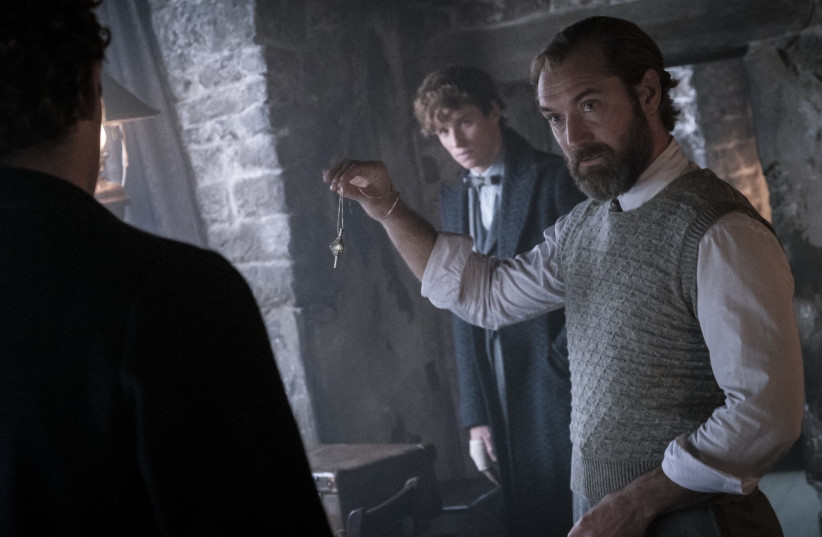Most millenials know the riveting feeling of walking into another Harry Potter film, so it’s only natural that walking into a showing of Fantastic Beasts: The Secrets of Dumbledore – the third installation of the spin-off film series – is strangely nostalgic.
This nostalgia is toyed with very purposefully throughout the entire film of Fantastic Beasts 3 – directed by David Yates and based on a screenplay by J. K. Rowling and Steve Kloves – during which a vast array of magical creatures, ranging from adorable to revolting, create that same burst of delight as we had when we saw Hagrid burst through the doors or Harry ride a broomstick for the first time.
The film, generally colorful and almost childlike in style, burst through some of the limits set forth in previous adaptations within the franchise, allowing for some more palpable violence than we’ve seen as of yet in the world of Harry Potter. Is that what we’ve been missing? I’m not so sure, but it does add to the sense of horror in the movie theater directed at big baddie Gellert Grindelwald, previously played by Johnny Depp, but amid the recent controversy surrounding his personal life, now played by Mads Mikkelsen.
Indeed, the musical score was produced by James Newton Howard, who worked on the previous two films in the series and is known for his magical melodies from The Dark Knight, Pretty Woman and Peter Pan. While using the continuous musical theme procured for the previous two films, he also worked strategically with the musical melodies by John Williams from the original Harry Potter films to bring about once more that sense of familiarity – especially in scenes in which Newt Scamander (Eddie Redmayne), the focalizer of the films, returns to Hogwarts.
As is often the case with this franchise, the film switched consistently between scenes of drama to action with touches of comedy in between. The storyline, however, didn’t formulate a cohesive base for this style, requiring some mental adjustments and a few “ah yes, I remember who that is” moments, making the film challenging to those who do not obsessively watch along as each new installation comes out. And, since it’s been four years since the last film debuted, needless to say most people would struggle to follow along and remember which character is related to who. The casting changes, as well, make the film quite a struggle to catch on to, as Tina Goldstein (Katherine Waterston) has been significantly cut in contrast to her presence in the prior two films, as well as the famed switch between Depp and Mikkelsen.

Still, the basis for the film’s plot is quite simple, though perhaps it was a sort of cheat: Confuse Grindelwald by sending each member of the team that’s taking him down in a different direction, each not knowing where the other is going. This allowed the film to get carried away with multiple storylines that overlapped and flipped around while still keeping a logical reasoning behind the often confusing motion.
Grindelwald’s character is perhaps the most disappointing in the film. While there is some significant progression with Albus Dumbledore’s character (Jude Law), including the revelation that he was once in love with Grindelwald, the latter made no such character developments. He was static for most of the film with the excuse of being sturdy and headstrong, but the creators missed an opportunity to add some depth and layers to his character that was greatly missing, especially with the value he adds to the overarching cinematic and literary universe.
Dumbledore, indeed, is not the silly old man we read about in the books, nor the more stoic and grippingly calm man we saw in the original films, but rather a smooth and charming man for which the credit must go to Law, who exhibits a sweet composition layered over painful recollections and a trauma-ridden past.
Meanwhile, Scamander – who has been charmingly absentminded since the first film – is his usual pleasant self, owing greatly to the erratic and genial performance by Redmayne.
With Rowling’s controversial reputation, alongside the mediocre reviews for the previous two films, we surely won’t see the film selling out the way that, say, Deathly Hallows: Part II did. Nevertheless, it’s worth a watch for the creative twists on action that a magical realm allows filmmakers to take, as well as for the pleasantly sweet animated magical creatures.
While it seemingly puts a definitive close on Scamander’s saga, there seems to be an open door to the inevitable final battle during which Dumbledore is to defeat Grindelwald once and for all – a battle described in the books as hands-down the most epic wizard battle in history. Will viewers have that satisfaction? We shall see. I’d bet on it.
